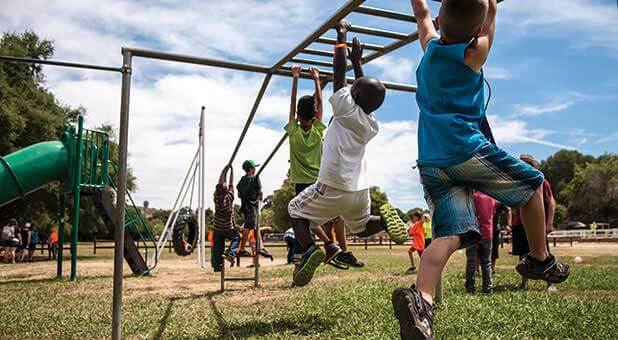Why did 10,000 adults volunteer as camp counselors at Royal Family Kids (RFK) camps across America last year? One volunteer sums it up: “Because it’s a vacation away from myself.”
“We’re really about engaging adults in discovery of what it’s like to be a foster child,” says Glenn Garvin, RFK’s vice president of national camps. “It’s a chance to participate in the gifting of patience and love along with the sheer brutality of the energy of youth.”
The church-sponsored camps are specially designed to meet the needs of foster children ages 6 to 12, many of whom have experienced abuse and neglect. With 195 camps available worldwide—175 in the U.S.—RFK has treated nearly 34,000 kids like royalty since 1985 by sharing God’s love. Taking as its cue Matthew 18:5, in which Jesus says, “Anyone who welcomes a little child like this on my behalf is welcoming me” (NLT), RFK is all about welcoming kids with a boatload of fun summer memories, especially since their lives are often capsized the rest of the year. Kids have been known to come home from camp only to be greeted by their foster parents and their suitcases, informing them they’re moving on. Many foster kids don’t stay in one home long enough to make close friends or be invited to parties, Garvin says, and many have never had a single birthday party—or even heard the birthday song.
So RFK throws a big party for the children every year at camp. Garvin recalls the year one 9-year-old girl smashed her face into her birthday cake. The counselors were stunned, but Garvin says it was something she’d always wanted to experience.
“In her mind, she was thinking, ‘I want part of my childhood back,’” he says.
RFK is a division of the Assemblies of God, yet individual camps are run by 27 different denominations. And the success of RFK camps can be seen in the return rate of counselors—some have volunteered for up to 20 years—and the 156 campers who returned as counselors last year. But even more praiseworthy is the fact that in 2013 alone, 56 children were adopted through relationships borne out of RFK camps.
Exhausted counselors and campers alike find it painful to say goodbye after a week of bonding. But they can continue the relationships formed through RFK clubs, which run throughout the year where they’re available. Clubs are led by volunteer staff who provide activities, music, puppet shows and the like, similar to Parents’ Night Out events, with approved mentors who were prior camp counselors.
“These kids go running to club like they’re running back to family,” says Joanne Feldmeth, RFK’s vice president of national clubs and mentors. “In foster care, everybody is paid to care for [the kids]. When they find out [club staff and mentors] are volunteering, it’s moving.”
With 38 RFK clubs operating in the U.S., it’s an endeavor requiring heavy lifting, in terms of volunteer commitment and organization, but churches serious about forming long-term relationships within the foster and adoptive communities will find it worthwhile and rewarding.
“The clubs and mentors program is a safe program, where churches can supervise,” Feldmeth says.
Additional programs like Teen Reach Adventure Camp and its accompanying Life Mentoring program are available for foster kids over age 12.
For more information, go to royalfamilykids.org. —Anahid Scweikert.














































